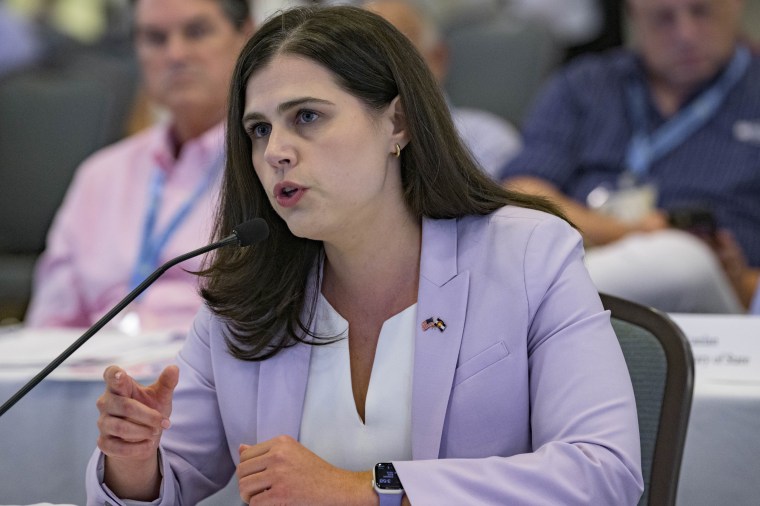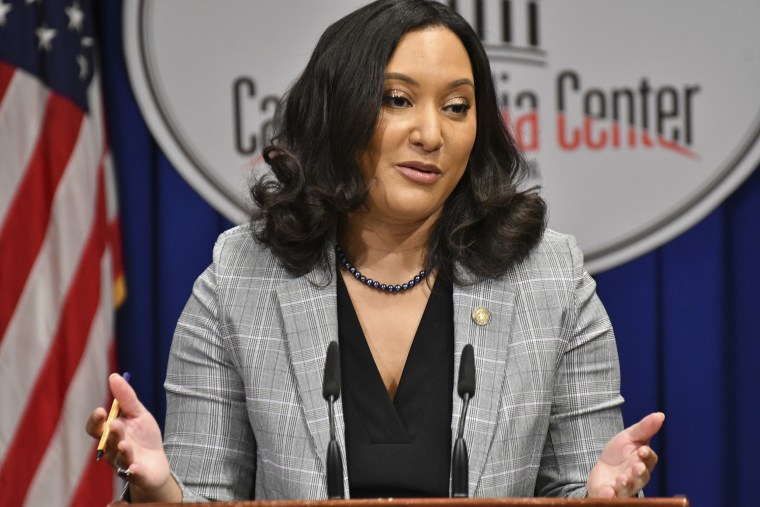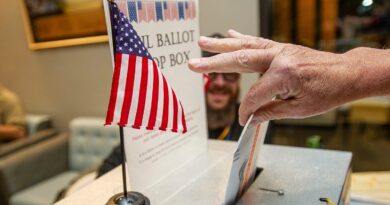County election boards pick new fights with states over voter fraud claims
The once-routine process of certifying local election results has become an increasingly popular venue for pushing voter fraud claims, prompting state officials to brace for legal fights after ballots are cast this fall.
County-level GOP officials in New Mexico and Pennsylvania have clashed with state agencies in recent weeks by balking at certifying results from primary elections held this spring, citing concerns about Dominion voting machines and certain mail-in ballots.
Those incidents — reminiscent of former President Donald Trump’s false claims of widespread voter fraud in 2020 — have rattled some state officials and election experts who worry that more Republican-led election boards will follow suit in November.
“It’s a wake-up call to all secretaries of state,” said Minnesota Secretary of State Steve Simon, adding that he’s discussed the issue with officials in other states.
“These recent episodes have certainly caused states to check the tools in their toolbox, to make sure that they have those tools and if not, to try to get them,” Simon, a Democrat, said in an interview with NBC News.
Minnesota state law requires that officials certify the highest vote getter, he said; after consulting with the state attorney general in the wake of the Otero incident in New Mexico, he believes the existing laws in his state are adequate to ensure the proper certification of results.

Rick Pildes, a constitutional law and elections expert at New York University School of Law, said the certification challenges from the primary season could very well occur in the general election.
“There is definitely a real risk that this is a harbinger of what may happen in at least some local election jurisdictions in the fall,” Pildes said.
Otero County was the first standoff to garner national attention this election cycle was, when the commissioners voted against certifying the primary election results. The commissioners — all Republicans — did not cite any specific irregularities and instead repeated debunked conspiracy theories about Dominion Voting Systems machines. After the state Supreme Court ordered the county to approve the results, two of the three commissioners eventually complied, providing the necessary majority to certify the results.
Michigan Secretary of State Jocelyn Benson, a Democrat, called Otero County “the canary in the coal mine.”
She said it was “the first shot across the bow, indicating to all of us what is going to be a very real strategy.”
For that reason, she said, her office is getting ready for similar challenges this fall.
“This has to be seen as yet another attack point in what has emerged as a multiyear, multifaceted effort to to delegitimize democracy in the mind of many voters,” she said.
Benson said she’s been preparing for more election challenges over the past two years. In 2020, Republican canvassers in Wayne County sought to rescind their votes to certify election results in Michigan’s biggest county by population. Trump allies also urged the state board not to certify President Joe Biden’s win in the battleground state.

Michigan is one of at least three states where legislators either have considered or have passed new legislation to address certification concerns.
Benson said she’s spoken with Republican lawmakers in the GOP-led Legislature about changing how canvassers are appointed and how they can be removed if they refuse to certify results. A citizen ballot initiative called Promote the Vote 2022, which advocates are trying to get on the ballot for November, also seeks to limit the power of county canvassers.
In Colorado, Secretary of State Jena Griswold, a Democrat, worked with the Democratic-controlled Legislature to put new election laws on the books earlier this year that would give her the power to step in and complete the canvass and certification process if local officials refused.

And in New Mexico, Secretary of State Maggie Toulouse Oliver told NBC News last month that “we have some tuning up of our election law to do,” such as creating an alternate process for certification.
While Toulouse Oliver won her standoff with Otero County, Pennsylvania officials are now engaged in a similar legal battle with three GOP-led counties that have refused to certify election results that comply with a court order to include mail-in ballots that weren’t dated by voters.
On Tuesday, Pennsylvania’s acting Secretary of the Commonwealth Leigh Chapman sued the counties of Berks, Fayette and Lancaster to try to force them to include the ballots in their final results.
The Berks County Board of Elections declined to comment, citing ongoing litigation. NBC News has reached out to representatives of the other two counties for comment.
A state judge has yet to rule on the matter.

Election officials and experts who spoke to NBC News said that while the kind of county-level efforts in New Mexico and Pennsylvania are unlikely to succeed — there are state and federal laws designed to protect voters’ choices from being undone by a few people — local officials can nonetheless delay certifying election results and cast doubts on a functioning electoral system.
Trust in American democracy — and not specific results — may be what’s most at risk here, some experts warned.
“The tentacles of the Big Lie have spread,” said David Levine, elections integrity fellow at the Alliance for Securing Democracy. He argued that because the Pennsylvania conflict centers on a dispute over laws regarding mail voting, it can do more damage than what took place in Otero County.
“There’s already plenty of uncertainty and doubt about mail voting in Pennsylvania,” he said. “And what these counties are doing is very likely going to create more momentum behind that.”
Jon Berkon, a partner at the Elias Law Group, said local officials refusing to certify results are most dangerous “in states where the legislature has a demonstrated history of election denialism and a willingness to upend longstanding democratic norms.”
The Elias Law Group represents Democrats and voting rights groups in litigation around the country.
“The recent New Mexico experience showed the importance of having pro-democracy officials in key positions to quickly strike back,” he said.
Some, however, believe the bigger problem is state legislators who promote false claims of voter fraud, which in turn have fueled certification challenges.
“We already have rules in place to stop people from subverting the outcome of our elections,” said Sean Morales-Doyle, a voting rights advocate at the Brennan Center for Justice at New York University School of Law. “What’s a concern is that there are people who are attempting to pass laws in this country to undermine those rules and to actually create more risk.”



